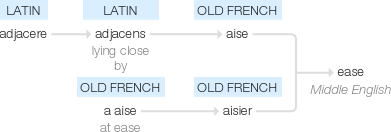Ease
Middle English: from Old French aise, based on Latin adjacens ‘lying close by’, present participle of adjacere . The verb is originally from Old French aisier, from the phrase a aise ‘at ease’; in later use from the noun.
wiktionary
From Middle English ese, ays, etc., from Anglo-Norman ese(“ease”), from Old French eise and aise(“ elbow room; opportunity”), of uncertain and obscure origin. Cognate with Provencal ais, Italian agio and asio, Sicilian aciu and Portuguese azo. [1] Sometimes ascribed to Latin*asia or *asium, possibly from ansa(“ handle; occasion”) [1] but more likely from a Vulgar Latin*adjace(m), from Latin adjacēns, present participle of adjaceō [2]. Alternatively, possibly from a non-Latin source such as Germanic or Celtic on the basis of the conflicting forms which appear in various Romance languages. [3] Compare Old English īeþe(“ easy”), Gothic 𐌰𐌶𐌴𐍄𐌹( azēti, “ease; pleasure”), *𐌰𐌶𐌴𐍄𐍃( *azēts, “ easy”), Breton eaz, ez(“ easy”), Irish adhais(“ easy; leisure”). Compare also Frankish *ansiju(“ loophole, eyelet; handle, arms akimbo, elbow room”). See also eath.
The verb is from Middle English esen, ultimately of the same origin.
etymonline
ease (n.)
c. 1200, "physical comfort, undisturbed state of the body; tranquility, peace of mind," from Old French aise "comfort, pleasure, well-being; opportunity," which is of uncertain origin. According to Watkins is ultimately from Latin adiacens "lying at," present participle of adiacere "lie at, border upon, lie near," from ad "to" (see ad-) + iacere "to lie, rest," literally "to throw" (from PIE root *ye- "to throw, impel"). Recent dictionaries in English and French seem to support this derivation, though older sources found objections to it. Compare adagio.
At ease "at rest, at peace, in comfort" is from late 14c.; as a military order (1802) the word denotes "freedom from stiffness or formality."
ease (v.)
c. 1300, "to help, assist," from Old French aiser, from aise (see ease (n.)). Meaning "to give ease, mitigate, alleviate, relieve from pain or care" is from mid-14c. Meaning "render less difficult" is from 1630s; the sense of "to relax one's efforts" is from 1863 (with up by 1907, earlier with a more specific sense in sailing). Farmer reports ease in a slang sense of "to content a woman" sexually, with an 1861 date. Related: Eased; easing.
